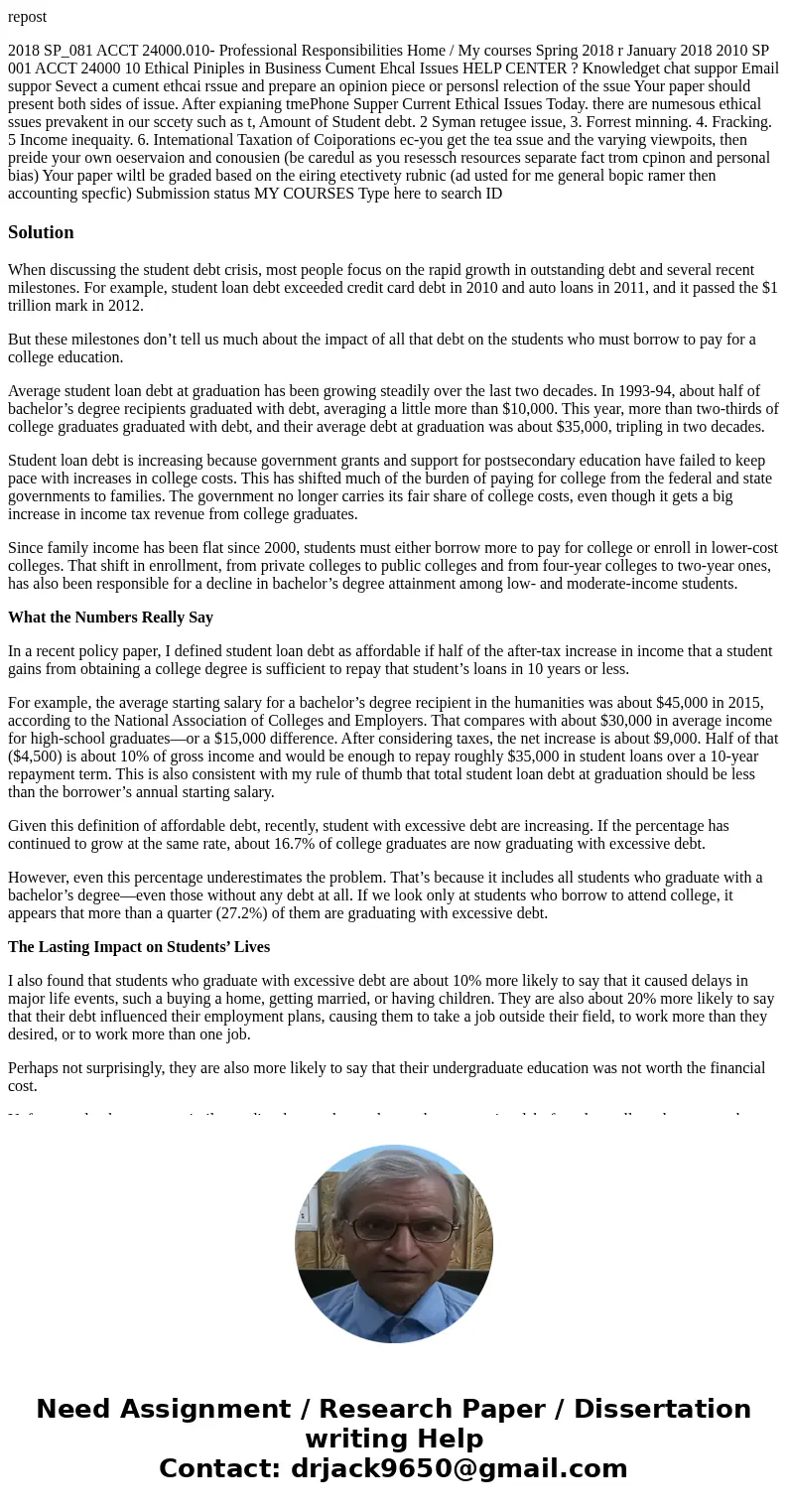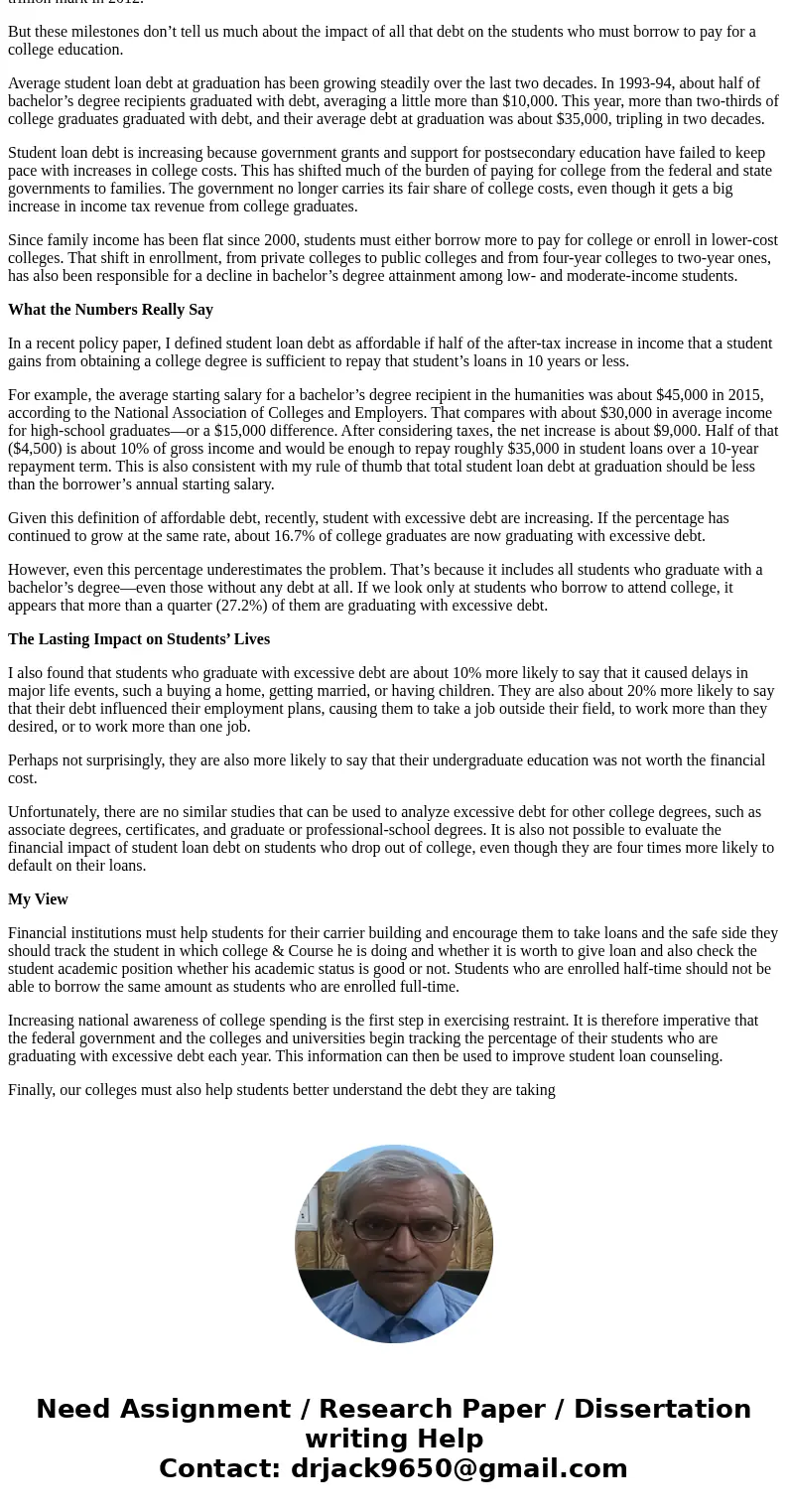repost 2018 SP081 ACCT 24000010 Professional Responsibilitie
repost
2018 SP_081 ACCT 24000.010- Professional Responsibilities Home / My courses Spring 2018 r January 2018 2010 SP 001 ACCT 24000 10 Ethical Piniples in Business Cument Ehcal Issues HELP CENTER ? Knowledget chat suppor Email suppor Sevect a cument ethcai rssue and prepare an opinion piece or personsl relection of the ssue Your paper should present both sides of issue. After expianing tmePhone Supper Current Ethical Issues Today. there are numesous ethical ssues prevakent in our sccety such as t, Amount of Student debt. 2 Syman retugee issue, 3. Forrest minning. 4. Fracking. 5 Income inequaity. 6. Intemational Taxation of Coiporations ec-you get the tea ssue and the varying viewpoits, then preide your own oeservaion and conousien (be caredul as you resessch resources separate fact trom cpinon and personal bias) Your paper wiltl be graded based on the eiring etectivety rubnic (ad usted for me general bopic ramer then accounting specfic) Submission status MY COURSES Type here to search IDSolution
When discussing the student debt crisis, most people focus on the rapid growth in outstanding debt and several recent milestones. For example, student loan debt exceeded credit card debt in 2010 and auto loans in 2011, and it passed the $1 trillion mark in 2012.
But these milestones don’t tell us much about the impact of all that debt on the students who must borrow to pay for a college education.
Average student loan debt at graduation has been growing steadily over the last two decades. In 1993-94, about half of bachelor’s degree recipients graduated with debt, averaging a little more than $10,000. This year, more than two-thirds of college graduates graduated with debt, and their average debt at graduation was about $35,000, tripling in two decades.
Student loan debt is increasing because government grants and support for postsecondary education have failed to keep pace with increases in college costs. This has shifted much of the burden of paying for college from the federal and state governments to families. The government no longer carries its fair share of college costs, even though it gets a big increase in income tax revenue from college graduates.
Since family income has been flat since 2000, students must either borrow more to pay for college or enroll in lower-cost colleges. That shift in enrollment, from private colleges to public colleges and from four-year colleges to two-year ones, has also been responsible for a decline in bachelor’s degree attainment among low- and moderate-income students.
What the Numbers Really Say
In a recent policy paper, I defined student loan debt as affordable if half of the after-tax increase in income that a student gains from obtaining a college degree is sufficient to repay that student’s loans in 10 years or less.
For example, the average starting salary for a bachelor’s degree recipient in the humanities was about $45,000 in 2015, according to the National Association of Colleges and Employers. That compares with about $30,000 in average income for high-school graduates—or a $15,000 difference. After considering taxes, the net increase is about $9,000. Half of that ($4,500) is about 10% of gross income and would be enough to repay roughly $35,000 in student loans over a 10-year repayment term. This is also consistent with my rule of thumb that total student loan debt at graduation should be less than the borrower’s annual starting salary.
Given this definition of affordable debt, recently, student with excessive debt are increasing. If the percentage has continued to grow at the same rate, about 16.7% of college graduates are now graduating with excessive debt.
However, even this percentage underestimates the problem. That’s because it includes all students who graduate with a bachelor’s degree—even those without any debt at all. If we look only at students who borrow to attend college, it appears that more than a quarter (27.2%) of them are graduating with excessive debt.
The Lasting Impact on Students’ Lives
I also found that students who graduate with excessive debt are about 10% more likely to say that it caused delays in major life events, such a buying a home, getting married, or having children. They are also about 20% more likely to say that their debt influenced their employment plans, causing them to take a job outside their field, to work more than they desired, or to work more than one job.
Perhaps not surprisingly, they are also more likely to say that their undergraduate education was not worth the financial cost.
Unfortunately, there are no similar studies that can be used to analyze excessive debt for other college degrees, such as associate degrees, certificates, and graduate or professional-school degrees. It is also not possible to evaluate the financial impact of student loan debt on students who drop out of college, even though they are four times more likely to default on their loans.
My View
Financial institutions must help students for their carrier building and encourage them to take loans and the safe side they should track the student in which college & Course he is doing and whether it is worth to give loan and also check the student academic position whether his academic status is good or not. Students who are enrolled half-time should not be able to borrow the same amount as students who are enrolled full-time.
Increasing national awareness of college spending is the first step in exercising restraint. It is therefore imperative that the federal government and the colleges and universities begin tracking the percentage of their students who are graduating with excessive debt each year. This information can then be used to improve student loan counseling.
Finally, our colleges must also help students better understand the debt they are taking


 Homework Sourse
Homework Sourse